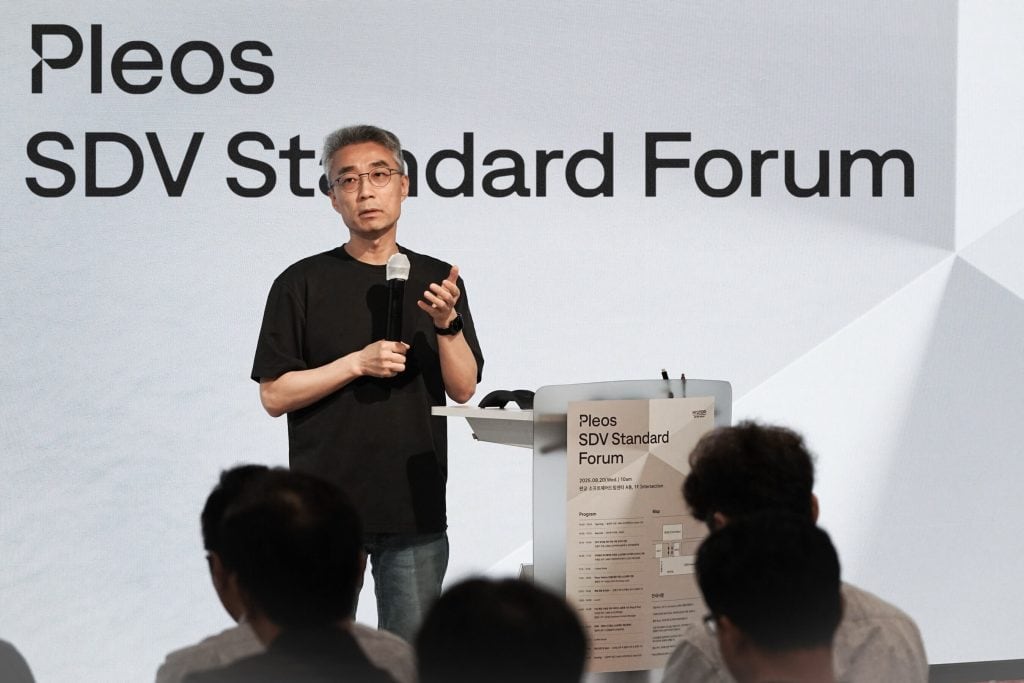
Software-defined vehicles represent a paradigm shift in how cars are designed, built, and updated. Unlike traditional vehicles, which rely heavily on hardware locked in at the time of production, SDVs are engineered to receive ongoing software updates, new features, and performance enhancements long after they leave the factory. For Hyundai Motor Group, this transition is more than a technological upgrade—it is a complete rethinking of the automotive development ecosystem, one that transforms the conventional vertical supply chain into a horizontal, software-driven collaboration network.
The Pleos SDV Standard Forum aimed to accelerate this shift by sharing the Group’s latest technical standards, development tools, and collaborative frameworks with its partners. The sessions underscored the need for a common set of practices that will enable SDV mass production and allow suppliers, software developers, and diagnostic specialists to align seamlessly in the rapidly evolving industry.
“Close collaboration with key partners and the widespread adoption of standardized development frameworks are essential for implementing SDVs,” said Chang Song, President and Head of the Advanced Vehicle Platform Division at Hyundai Motor Group. “We are committed to building a software-centric collaborative network by sharing technical standards and creating a supply chain system capable of scaling SDV production worldwide.”
The forum featured five in-depth sessions covering a range of topics critical to the SDV transformation: transitioning traditional vehicle development methods for large-scale SDV production; applying CODA (Computing & I/O Domain-based E&E Architecture) to optimize hardware and enable more flexible software architecture; facilitating vehicle software development through the Pleos Vehicle OS; creating a standardized, scalable framework for external devices with plug-and-play compatibility; and developing integrated software tools to strengthen collaboration between original equipment manufacturers (OEMs) and suppliers.
One of the event’s key highlights was the unveiling of a new standardized software development framework designed specifically to support the unique demands of SDV development. This framework provides detailed, step-by-step guidelines to help partners integrate it into their own processes—from defining specifications and validating features to managing issues and tracking development progress. A notable feature is the secure, real-time data-sharing system that allows Hyundai Motor Group and its partners to connect development environments without compromising security.
The adoption of this standardized approach is expected to significantly improve both the efficiency and quality of SDV-related software development. By integrating expertise from a broad spectrum of partners, the Group aims to reduce redundancies, shorten development cycles, and improve the reliability of vehicle control units and related systems. This marks a fundamental departure from the hardware-heavy, siloed models of the past toward a more dynamic, interconnected approach that supports scalable, high-volume production of next-generation vehicles.
The Pleos SDV Standard Forum builds upon the momentum established at the “Pleos 25” developer conference held earlier this year, where Hyundai Motor Group unveiled its integrated software platform brand, Pleos, and introduced plans for a global in-vehicle app ecosystem. Moving forward, the Group plans to host regular forums, share updated technical roadmaps, and provide ongoing resources for partners seeking to adapt their own development processes to the demands of the software-defined era.
Through these efforts, Hyundai Motor Group is not only laying the groundwork for future mobility but also opening up new business opportunities for its partners worldwide. As the automotive industry undergoes one of its most profound transformations in decades, the Group is positioning itself—and its supply chain—as a leader in delivering vehicles that evolve over time, meeting both current and future consumer expectations with unprecedented flexibility and innovation.